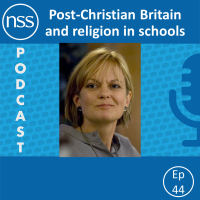
21st Century RE for All
We want every pupil to have the same entitlement to high quality, non-partisan education about religion and belief. We want to see all schools preparing young people for life in modern Britain by teaching pupils about the diversity of religious and non-religious worldviews.
We're campaigning for an end to the arbitrariness and unfairness of local determination in Religious Education and for a national religion and belief education syllabus as part of the National Curriculum.
What’s the problem?
Religious education is out of date and in need of reform. Almost thirty years after the introduction of a national curricular entitlement for all pupils, one subject remains exempt – religious education. Unlike any other compulsory subject RE is determined at a local level.
In each local authority the local agreed syllabus for religious education (RE) is determined by 'Standing Advisory Councils on Religious Education' (SACREs), largely made up of religious representatives, with non-religious representatives either excluded or barred from voting.
Even worse, many faith schools don't even need to follow the locally agreed syllabus, and can instead teach their own syllabus and teach religion from their own exclusive viewpoint.
If there is a body of knowledge called 'Religious Education', which is worthy of being taught at all, it should be offered to all children wherever they live. There are simply no grounds for discriminating on grounds of geographic location or school type. If a programme of study covering religion and belief deserves to be included in the school curriculum, it should be offered to all as a basic entitlement for every future citizen. This is simply a matter of fundamental justice and equality.
Importantly, the subject must be broad, balanced and inclusive. Religious interest groups should no longer determine what gets taught. As with other subjects, the syllabus should be nationally determined by independent educationalists without an agenda motivated by a specific religion or belief.
"The structures that underpin the local determination of the RE curriculum have failed to keep pace with changes in the wider educational world. As a result, many local authorities are struggling to fulfil their responsibility to promote high-quality religious education"
OFSTED report 'Religious Education: Realising the Potential'
Get involved
With the General Election coming up, as a nation we're thinking about our future. Please consider asking your candidate to support common sense secular reforms — such as reforming religion and belief education — that will make our society, education system, and laws fairer for all.
It’s time to take religious education in schools out of the hands of religious councils. Support a national entitlement to high quality, non-partisan education about religion and belief.
Sign the petition-
A selection of comments from the petition. Supporters on what this campaign means to them and the need to reform religion and belief education.
Find out more
NSS submission to the Commission on Religious Education
We’ve called on the Commission to support pupils’ basic entitlement to non-partisan education about religion and belief, and an end to RE controlled by religious groups or faith schools.
Religious Education and the law
RE is a statutory part of the basic curriculum in all schools, but is often shaped by local religious groups and faith schools.
Your rights: Withdrawal from RE and Collective Worship
We advocate comprehensive non-partisan reform of religion and belief education and an end to compulsory worship in schools, so no one has to withdraw from any part of the school day.
Why Religious Education must be reformed before ending parental opt-out
The right to withdraw from RE may sometimes be problematic, but is still necessary when until vestiges of confessionalism, proselytization and poor practice remain.
Standing Advisory Councils on Religious Education
Dominated by religious representatives, SACREs determine the RE syllabus at a local level.
Related news and opinion
Major reform of teaching on religion and belief passes in Wales
Posted: Tue, 9 Mar 2021 18:37
Legislation which will substantially reform the teaching of religion and belief, including by requiring coverage of secularism as a key concept, has passed its final parliamentary vote in Wales.
The Senedd has today voted to pass a bill which provides the legal framework to introduce a new skills-based curriculum in all schools in Wales.
The National Secular Society, which has strongly lobbied ministers in Wales over curricular reform, has welcomed some significant changes introduced by the bill.
These include:
- Replacing religious education (RE) with religion, values and ethics (RVE), a new subject which will fit in a humanities section of the curriculum.
- Introducing statutory relationships and sexuality education (RSE) in all schools, under a health section of the curriculum.
- Explicitly requiring RVE to cover secularism as a key concept and include non-religious worldviews alongside major religions.
- Requiring faith schools to provide families with the option of RVE according to the locally agreed syllabus, which is more pluralistic than the faith-based alternative.
Ongoing NSS concerns
But the NSS also warned that the bill represented a missed opportunity in other regards, noting that:
- Some faith schools will continue to be able to teach faith-based RVE, meaning they are likely to face practical difficulties in running two syllabuses and undervalue the locally agreed option.
- Ending parents' right to withdraw children from RVE may lead to legal challenges where the subject is insufficiently pluralistic and objective.
- The RVE syllabus will continue to be determined by local bodies, known as SACREs or ASCs, where representatives of faith and belief groups hold significant influence.
- Faith schools will continue to teach RSE from a faith-based perspective. NSS research has shown this has led to inaccurate, shame-based or incomplete coverage of issues deemed 'controversial' by some religious groups.
- The curriculum reform does not address the legal requirement on all schools in Wales to hold a daily act of broadly Christian collective worship, despite recommendations from the UN Committee on the Rights of the Child.
NSS comment
NSS head of education Alastair Lichten said: "This landmark piece of legislation will give pupils across Wales access to a more objective way of learning about religion and belief.
"But government concessions will mean religious groups' interests continue to enjoy a privileged input into this subject area – and to shape the way it's taught in many faith schools.
"All children should be entitled to an impartial and pluralistic education on religion and belief. Policy makers across the UK should work to make this a reality.
"We also welcome the Welsh government's move to make relationships and sexuality education statutory. This represents a significant step forward for children's rights."
Notes
- Ministers will consult on and agree statutory guidance by September 2021 to allow the new curriculum to come into effect in September 2022.
- Religious interest groups unsuccessfully lobbied against several of the changes in the bill, including the inclusion of secularism and non-religious worldviews on the curriculum.
- The NSS campaigns for all children to have an entitlement to a pluralistic and objective education on religion and belief.
Ep 44: Post-Christian Britain and religion in schools
Posted: Tue, 2 Mar 2021 08:00
This episode is about the place of religion in Britain today, both in society in general and in schools in particular. Emma Park interviews Linda Woodhead, professor of religion at Lancaster University.
In May this year, Linda will be giving a lecture series at Birmingham University entitled 'Values are the New Religion: Britain's post-Christian Culture'. The first part of her interview deals with her research into the decline of Christianity in Britain over the last 100 years, the reasons why this has happened, and to what extent non-religious people look for analogous systems to give their lives meaning and structure. During the pandemic, the NHS may even have become a surrogate for organised religion.
If Britain is becoming less religious, this raises the question of what its place ought to be in our education system. The admissions procedures commonly used by faith schools can unfairly discriminate against non-religious children. There are also many problems with the way Religious Education is currently taught. The Welsh government is reforming its RE provision: there is a strong argument for doing the same in England, but successive administrations have dragged their feet.
Emma is then joined by Alastair Lichten, head of education at the NSS, to reflect on Linda's words and give the NSS's perspective.
Watch this episode on YouTube | Direct MP3 Link | Transcripts
RE shouldn’t be a vehicle for the Church of England’s interests
Posted: Thu, 17 Dec 2020 14:20
A new study of a widely-used set of RE resources illustrates the way powerful groups control the subject to accommodate the evangelical mission of the Church of England, says Chris Selway.
Imagine if the history curriculum in schools was controlled by the Tudors – or the Victorians. The subject would be distorted by the worldview of the powers controlling it. This parallels what is happening to the subject of religious education. RE is being funded and controlled by Christian, usually Church of England aligned, trusts and producer communities – groups who produce resources to shape how their religion is covered.
In my new report (Understanding Christianity and the study of religion and worldviews: How the Church of England has gained control of religious education) I outline how the church and its agents have shifted the subject away from the ideal of a realistic, critically engaged, impartial and pluralistic study of religion and worldviews to fit with their own vision for education.
For most schools, RE has many aims but is primarily about developing a religious literacy that enables pupils to negotiate a religiously plural society. But the Church of England, with its long history of involvement with RE, is keen to pass on its faith to the next generation. Its evangelical mission is not limited to pupils in its own schools.
And sympathetic groups have been able to put their stamp on RE syllabuses in schools across much of the country. As local authorities have slipped from power in education, control of RE has fallen into the hands of producer communities, usually funded by Christian trusts.
The most prolific is RE Today, listed as a trading name for the charity Christian Education Movement. Its team of advisers also provides leadership and sponsorship for the National Association for Teachers of Religious Education (NATRE). RE Today developed the Understanding Christianity resource for the C of E. Members of its team, along with many C of E diocesan advisers, also act as advisers for numerous Standing Advisory Councils on Religious Education (SACREs), which determine RE curricula at a local level.
RE Today produces two model syllabuses that the 150 or so regional SACREs can use under licence with local authority funding. As part of the licencing agreement, the syllabus is not to be reproduced or published openly. So, unlike the National Curriculum, what children are learning in many schools is hidden behind password protected websites. This is highly unusual and conflicts with the interests of parents, school visitors and the general public who have provided the funding.
Its first syllabus – 'Model A' – originally included the note that it was approved for use in C of E voluntary aided schools. The coverage of Christianity has most learning outcomes linked to Biblical passages. In total, about 40 other authorities have adopted this model or one almost identical to it. It means they are, probably unwittingly, legally obliging teachers in many schools to follow a syllabus that was designed to suit the expectations of the small minority of the more evangelical C of E schools.
RE Today's 'Model B' syllabus relies heavily on the 2016 Understanding Christianity resource. This syllabus has now reached almost 20 local authorities. The result is that a great many community schools nationally are now following a syllabus that is deferential to the C of E's expectations for the subject. It is closely mirrored by 'diocesan syllabuses' nationally to ensure that, even if their schools are following a different syllabus, Understanding Christianity is the expected resource for the teaching of Christianity in all of their schools.
Understanding Christianity has clear limitations, and these have always been noted on its dedicated website. Most importantly it is a resource for the teaching of Christianity and not teaching about Christianity. There is no historical framework to help pupils understand the development of Christianity from a small Jewish cult to the diverse range of beliefs and practices that fall under the umbrella term of Christianity in the world today.
It relies on an underpinning notion of 'text-impact-connections', which is deeply flawed. It posits that Christians are primarily motivated by the Bible, this has an impact on them and then pupils should reflect on how that teaching connects with their own lives. The only evidence offered is by way of case studies of unusually devout individuals and groups with no reference to empirical data. There is almost no acknowledgement of the fluid and syncretic nature of Christian belief and practice, whilst mainstream Protestant or Anglican church teachings are generalised as being the accepted norm for Christians.
The resource tends to depict Christian teachings as timeless and uncontroversial, neglecting to consider contradictions and conflicts which would undermine that narrative. It asks leading questions, such as "What did Jesus do to save human beings?". And by emphasising the positive impact of Christianity, it helps to perpetuate the essentialising of religion which academics have identified as a serious weakness in the subject.
In some ways, Understanding Christianity can be a useful tool for teachers. But it is not available for public scrutiny. Access to it is restricted to those schools who have attended a training course, usually run by diocesan advisers. Its approach and the extent of its influence illustrate a wider problem: religious groups and producer communities enjoy too much control over the leadership, financing and teaching of RE.
A balanced study of religion and worldviews, for example, may well show how a communal worldview can enrich and enhance people's lives and benefit society. But it should also show how religions and worldviews can be motivators for harmful practices and how, for many, leaving a religion can be empowering, liberating and life-enhancing. The fact that only a minority of adherents are devout must be acknowledged.
A change of approach may also help to address the lack of credibility around the teaching of religion as it stands. According to YouGov polling, religious education is one of the least valued subjects in our schools. Tackling this requires the complete remodelling of the administration, teaching, resourcing and monitoring of RE, or 'Religion and Worldviews' as suggested by the Commission on Religious Education in 2018.
But it may also be that powerful groups, such as the Church of England and the producer communities, stand in the way of the reform necessary to make that happen. That would beg the question of whether religious education is redeemable in its current form. Perhaps the subject itself needs to be reconsidered. In an increasingly pluralistic and non-religious society, religion could instead form part of a wider study of cultural, political and societal diversity.
Either way, religion should be taught in an objective, critically-informed and pluralistic manner. Education shouldn't be a vehicle for bringing up the next generation of believers.
And in the meantime, if you don't know what your child is being taught in RE lessons it might be worth your while investigating whether they are being taught Christianity or taught about Christianity.
Chris Selway's research is available for download now.
Religious pressure resisted as Welsh RE reform plans progress
Posted: Wed, 9 Dec 2020 13:11
A major curriculum reform bill which would replace religious education with a more pluralistic alternative in Wales will proceed to the next parliamentary stage after a Senedd committee's recommendation.
The Children, Young People and Education Committee has recommended that the Senedd agree the general principles of the Curriculum and Assessment (Wales) Bill.
The National Secular Society was among groups who gave evidence during the committee's scrutiny of the bill, and the committee's report drew heavily on the NSS's evidence.
The bill will replace RE with religion, values and ethics (RVE), among other reforms, which include making comprehensive relationships and sexuality education (RSE) compulsory.
The committee did not recommend further religious exemptions or loopholes in the bill, despite calls from some faith groups including the Catholic Education Service (CES).
The CES has rigorously objected in particular to the fact the bill will require faith schools to offer a pluralistic RVE option that must be in accordance with the locally agreed syllabus.
NSS position on the bill
The NSS largely supports the Welsh government's efforts to reform RE, although it has warned that ministers risk falling short of their own ambitions.
The society's concerns include the fact that the new syllabus will still allow faith schools to teach a denominational form of RVE, although they will be required to offer a more objective and pluralistic option where parents request it.
The NSS has also raised concerns that some pupils will miss out on comprehensive rights-based RSE where faith schools are permitted to teach it through an often discriminatory religious ethos.
The NSS has long argued that children should receive an objective and pluralistic education on religion and belief.
Committee's key recommendations
In a report outlining its findings, published last Friday, the committee said the Welsh government should:
- Consider concerns around the purpose of local bodies which determine RE curricula, currently known as standing advisory councils on religious education (SACREs). It noted NSS criticisms of SACREs, which tend to be heavily influenced by religious interests.
- Launch a myth-busting campaign around relationships and sex education – a recommendation which the NSS helped to secure.
- Clarify why the bill did not provide for older children to choose the form of RVE they prefer when they are mature enough.
- Consider how it can ensure the place of human rights, including children's rights, is "secure in the long-term" in the curriculum.
- Prescribe more key material where there are concerns it could otherwise drop off the syllabus.
NSS extensively quoted in report
The report featured mentions of the NSS's concerns around:
- Faith schools' ongoing ability to teach a denominational syllabus.
- Plans to remove the parental right to withdraw children from RVE while the potential remained for the subject to be used as a vehicle for proselytisation.
- The fact that the bill does not contain plans to abolish the requirement on schools to hold acts of collective worship.
In response to the report's publication the NSS has now briefed members of the Senedd, who are due to debate the bill and the committee's report next week.
NSS comment
NSS head of education Alastair Lichten said: "The committee has rightly resisted religious pressure which would water down children's right to a pluralistic and critically-informed education on religion and belief.
"It's also made several helpful recommendations which should prompt ministers to take further steps to put children's interests before those of religious groups."
C of E’s control of RE damages subject’s credibility, says study
Posted: Wed, 9 Dec 2020 08:51
The Church of England's theological approach to religious education has come to dominate the subject amid a lack of leadership from national government, research has found.
The findings come in Understanding Christianity and the study of religion and worldviews, an academic study by former RE teacher Chris Selway which is published today.
The study says that, with often poorly-funded regional advisory councils in charge of RE syllabuses, there has been "a surge in resources that emphasise scriptural-based learning".
It says a government failure to provide funding for academics and other experts to guide the subject has helped to create this vacuum.
And it adds that major resource providers funded by Christian trusts have increasingly assumed control over the subject and moulded it to suit their vision.
Understanding Christianity
It says the widely-used resource Understanding Christianity exemplifies the way RE is used to advance the C of E's vision for education.
Its criticisms of the resource include that:
- It lacks a historical framework to help pupils understand the development of Christianity.
- It promotes poorly-evidenced assertions about what motivates Christians and presents Christian beliefs as largely monolithic.
- It tends to depict Christian teachings as timeless and uncontroversial, neglecting to consider contradictions and conflicts which would undermine that narrative.
- It asks leading questions, such as "What did Jesus do to save human beings?"
- It emphasises only the positive impact of Christianity and helps to perpetuate the essentialising of religion which academics have identified as a serious weakness in the subject.
Over 10% of local authorities have adopted syllabuses that rely on Understanding Christianity, which is funded by a Christian trust that works closely with the C of E.
As a result the resource is used in both many C of E schools and many secular schools.
Key recommendations
The paper argues that several changes are necessary if RE is to gain credibility with the public:
- It should be taught through an objective, critically-engaged and pluralistic approach.
- Education about religion should explore both the positive and negative consequences of religion in a balanced way.
- RE should take "more of a socio-historical or anthropological approach", rather than one which is focused on theology.
- There should be a "major shift" in the funding and management of RE.
It also asks whether such a wholesale restructuring of the subject is possible given the influence which powerful groups such as the C of E exercise over the RE curriculum.
And it says this prompts the question of whether a new subject that "encompasses wider cultural, political, religious and societal diversity and how they interact" may be more appropriate than RE.
Comments
Report author Chris Selway said: "The lack of an external body to set out a clear disciplinary field for religious education has led to a situation where Christian–funded and oriented organisations have been increasingly able to seize control of the subject.
"This has led to a surge in resources that emphasise scriptural–based learning and a predominance of theology as a discipline for studying religion, particularly when studying Christianity.
"It seems clear that the way RE is administered, resourced, taught and monitored need to be remodelled, to ensure religion is taught in a balanced way."
Alastair Lichten, the National Secular Society's head of education, said: "Too often RE is dominated by vested interests and associated group think, and this paper powerfully highlights the way it's been used to advance the Church of England's interests.
"RE currently lacks a unified framework and agreed purpose, leaving the door open for unaccountable groups to impose their own. Everyone who cares about education on religion and belief should be concerned.
"Chris Selway's report makes a significant contribution to debate in this area, and should prompt some uncomfortable questions at both local and national levels."
Notes
- In 2018 a report from the Commission on Religious Education recommended replacing RE with 'Religion and Worldviews' and introducing a national entitlement to it in England.
- Earlier this year the Welsh government published legislation to replace RE with a more pluralistic subject, called Religion, Values and Ethics.
- The research was supported by the NSS's scholarship programme.
For RE news stories click here.







